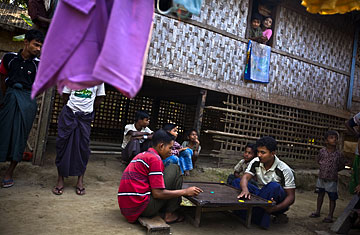
Daily life in Nazi, a Rohingya village in Sittwe, Burma
'Sorry,' I was told, 'but there are no Rohingya here.' I was mystified. From everything that I had heard about this persecuted Muslim minority, the Rohingya come from western Burma's isolated Arakan State. Hundreds of thousands of Rohingya, who speak a dialect similar to that of Bengalis from neighboring Bangladesh, have fled the brutality of Burma's military regime by escaping their Buddhist-majority homeland for lives as illegal immigrants. The ruling junta has denied the Rohingya some of the most basic human rights — no citizenship, no freedom of movement, no marriage without permission. In January, their plight made headlines when Thai forces reportedly towed hundreds of Rohingya boatpeople who made it to Thai territorial waters back out to sea in leaky vessels with little food or water. Some are now missing and presumed dead. The Rohingyas' situation is so acute that they were a major topic of discussion at last week's summit of the Association of Southeast Asian Nations.
But now that I'd made the long trip to Arakan, there was a strange lack of information on the Rohingya. Many locals denied their very existence. (The Burmese government, in a curious feat of logic, denies having mistreated the Rohingya, since there is, according to Foreign Minister Nyan Win, no such a minority group in Burma.) Then, a break: a Buddhist Arakan local confided that there were some ethnic Bengalis who lived in a nearby village. He guessed that they'd come from Bangladesh to Burma 10 or 20 years ago and were living in Arakan illegally. Would I like to meet them? Yes, I would. (Read about Burma's different ethnic minorities.)
The village, with the unfortunate name of Nazi, was dusty and poor. Burmese villages, generally, are dusty and poor, but this place felt more downtrodden than most. The sour smell of anxiety pervaded the air. Eventually, O Lam Myit, the 75-year-old village patriarch, shuffled up, his eyes milky, his longyi (or sarong) frayed, a ragged prayer cap on his head. Like his father and grandfather, he was born in Arakan state. O Lam Myit laughed when I told him that many Burmese thought this village was populated only by recent economic migrants from Bangladesh. In 1978, he was returning from a visit to his home village in the northern part of the state when Burmese immigration officers stopped him at the ferry jetty and told him there was a mistake on his national registration card. He was to turn it in and receive a new one soon. That was three decades ago; the new proof of citizenship never arrived. Since then, O Lam Myit, like everyone else in his village, has not been able to travel without applying for an exorbitantly priced permit.
The villagers of Nazi spoke of a regime that conscripted them as forced labor and made them pay prohibitive taxes or buy expensive business licenses that robbed them of any chance at economic mobility. Because they are not considered citizens of Burma, they cannot work in the public sector as teachers or soldiers or doctors. Nor can they attend university in Arakan's capital, Sittwe, where communal violence between Buddhists and Muslims flared eight years ago. The villagers' tone when describing their plight was matter-of-fact, as if they were complaining of a rainstorm or a bad case of influenza. To marry, some Rohingya must sign a document promising not to bear more than two children — a regulation that presumably ensures the number of Muslim inhabitants of Arakan doesn't mushroom faster than the Buddhist population. Burmese prejudice against the Rohingya is as casual as it is cruel. When international indignation over the junta's treatment of the Muslim minority erupted earlier this year, Burma's consul general to Hong Kong issued a letter saying that the Rohingya could not possibly be Burmese since they were "dark brown" and "ugly as ogres."
Toward the end of my visit to Nazi, I sat in the privacy of a bamboo-floored stilted house, where locals felt more comfortable talking. I asked the villagers if they considered themselves Rohingya. The room full of around 20 people erupted into argument. I couldn't understand what they were saying, but it was clear that there was significant disagreement. Finally, one man spoke. "Some people call us Rohingya," he said cautiously. I realized they were afraid to be identified as Rohingya because the very word carried with it the likelihood of so much discrimination. The man's name was Muhammad — he gave me his Bengali name, not the Burmese one that Rohingya are also required to have — and he left Burma two years ago on a crowded wooden boat filled with wannabe migrants. Eventually, the vessel drifted to India's Andaman Islands, from which he and others were repatriated. Would he try his luck abroad again, I asked? The news of the recent boatpeople's experiences in Thailand had reached Arakan. He nodded, bouncing a child on his lap. Then, village elder O Lam Myit spoke. "I am old, so I cannot go," he said. "But for the young, it's worth risking death to go abroad. What's the point of staying here, in a place where we can do nothing?"
